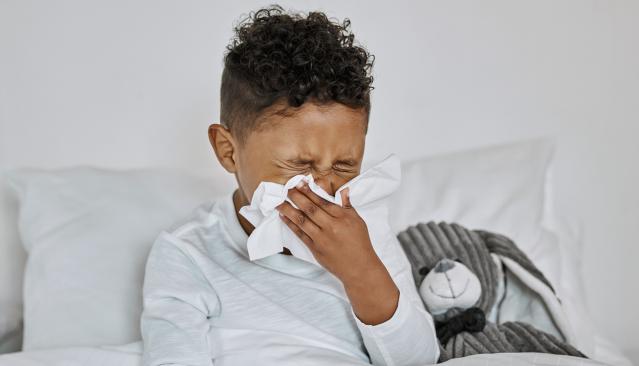Key points about teaching children to blow their nose
- tamariki need help to learn how to blow their nose
- most tamariki find it a difficult thing to learn, and it takes lots of practice
- take it in stages and make it a playful experience
- learn some fun ways to help teach your child to blow their nose

Teaching children to blow their nose
Teaching tamariki how to blow their nose in a way that is socially acceptable in Aotearoa New Zealand, is pretty important.
Many viruses, like the flu, spread easily through coughing, sneezing and touching infected surfaces. Teaching tamariki to blow their nose into a tissue and throw away the tissue can help reduce the spread of infection. It can also help them to clear their nose and breathe easier.
Different nose blowing practices
People from different cultures blow their noses in different ways. Some use handkerchiefs, some use tissues and some blow straight onto the ground. Some parents and whānau may use their own mouths to suck the mucus out of their child’s nose until they learn to blow their own nose. This technique is often used with younger pēpi (babies).
Learning nose blowing in stages
Whichever way whānau do it, tamariki need help learning how to blow their nose. Taking it in stages and making it a playful experience can help greatly. Doing nose blowing with, rather than doing nose blowing to tamariki, can make it easier.
Most tamariki find it a difficult thing to learn, and it takes lots of practice. Before they learn, most tamariki will use their sleeves or somebody else’s. Whānau will need to be patient while their child is learning this skill. Give lots of positive feedback about the new skill they’re developing.
Having fun helps when learning nose blowing
Let them pick a box of tissues
Letting a child choose their own box of tissues and even naming it for them can encourage them to use the tissues and heighten their awareness of when they need a tissue. Be gentle with any tissues, handkerchiefs and nose wipes. Little noses can be tender, especially when the child has a cold and their nose needs frequent wiping.
Let them blow their nose in front of the mirror
When they have a cold or a really runny nose, let them see themselves blow mucus from their nose in front of the mirror. Seeing the mucus come out shows them what’s in their nose that needs to come out. Show a positive reaction, not one of disgust, to encourage them.
Make up some fun games
Make up games involving inhaling and exhaling through their noses. For example, lay a feather, a piece of tissue or paper in their palm and see if they can blow it off using air from their nostrils. This can turn into a competition to see how high or far they can blow them.
Practise blowing bubbles underwater
Bath time can give another opportunity to practise nose blowing. Play a game of bubble blowing using air through their nose just under the water. See if they can blow bubbles while keeping their mouth closed.
Acknowledgements
Content adapted from a resource created by Tākai. Tākai (now closed) provided parenting information and resources for whānau supporters.
Photo: iStock
